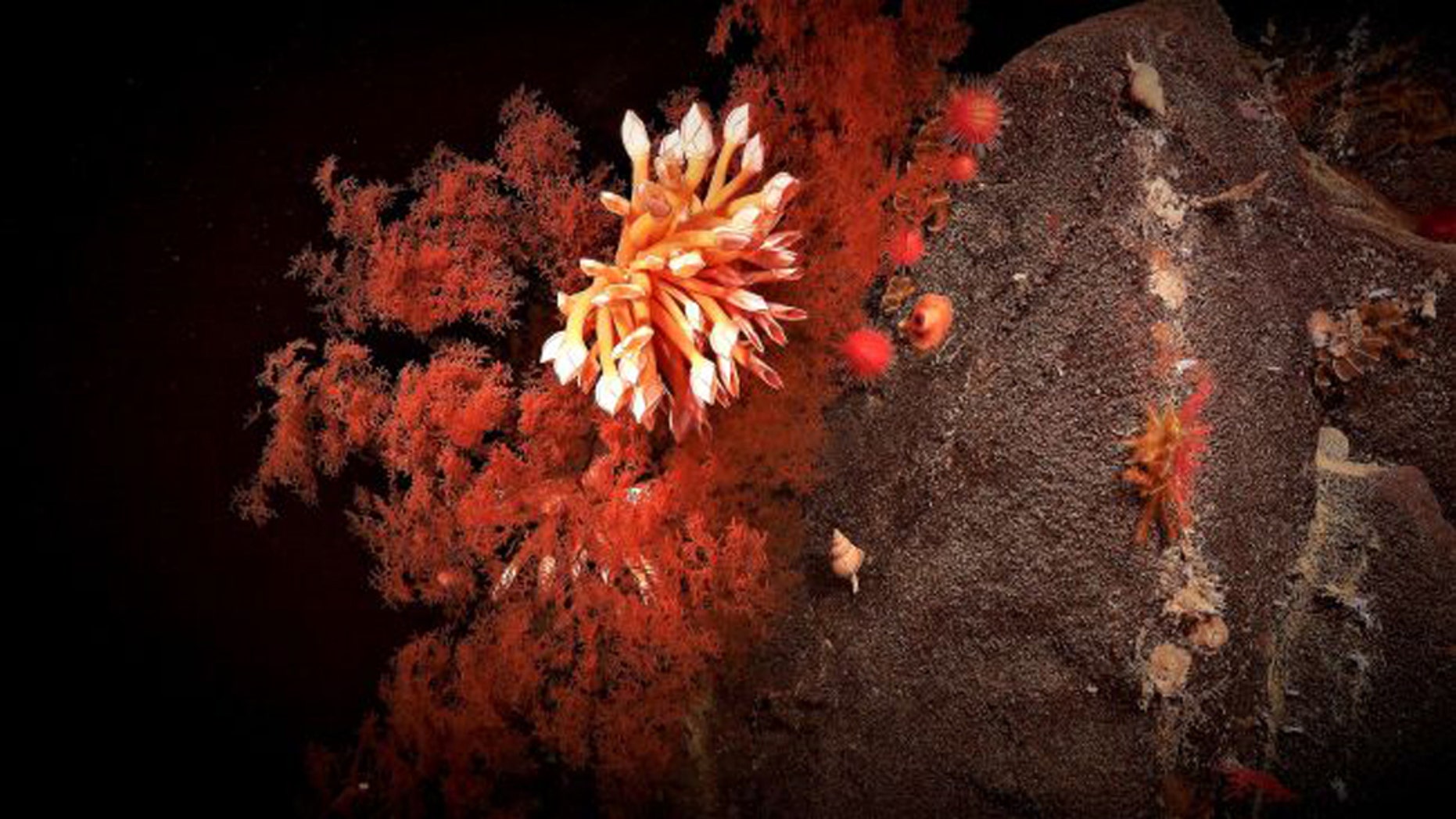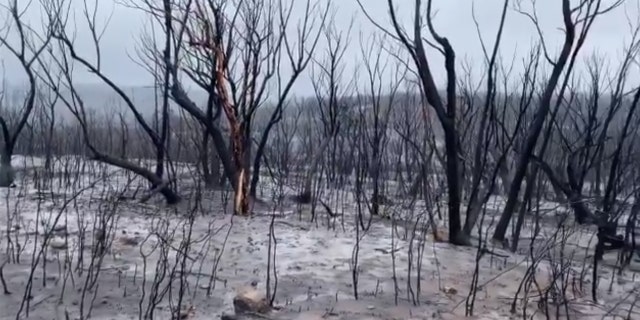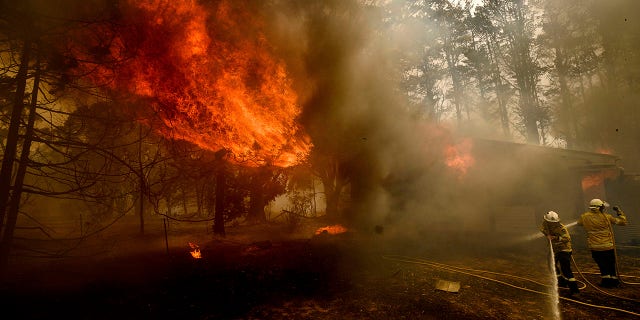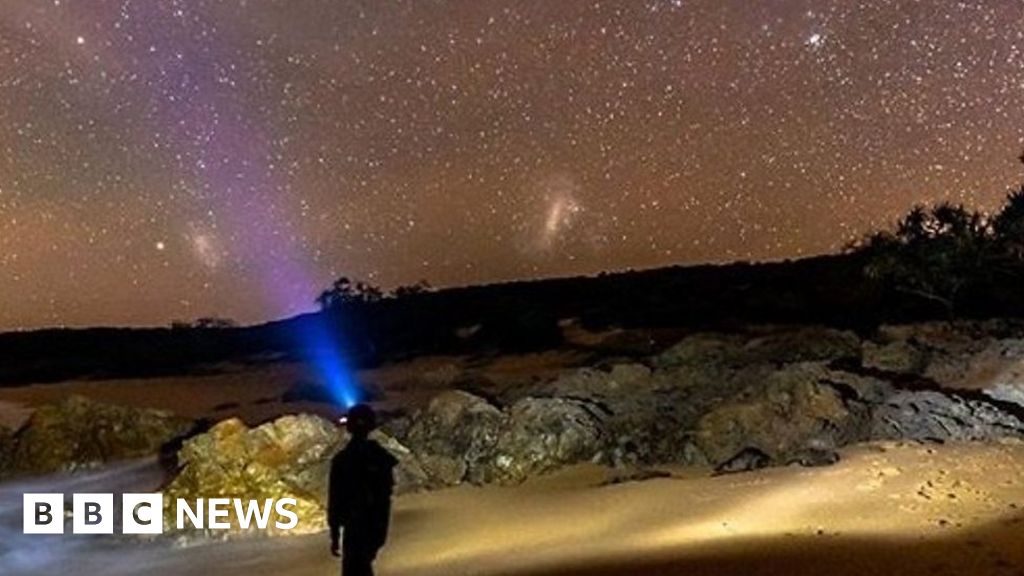Coral blooms in the abyssal depths of Australia's southern coast. (Credit: ROV SuBastian/ SOI)
The South Australian coast is surrounded by a labyrinth of underwater canyons, many of them still unexplored. Last week, an international team of researchers (and their underwater robot companion) completed a survey of three such canyons, uncovering a hidden world of both thriving coral gardens and ash-white coral graveyards.
According to the expedition members, the fate of these hidden ecosystems, which sit in the immediate path of the increasingly warm water flowing out of Antarctica's Southern Ocean, could be a preview of how farther-flung ocean life will react to ongoing global warming.
"This has global implications given these waters originate from around Antarctica [and] feed all of the major oceans and regulate our climate system," expedition member Malcolm McCulloch, of the University of Western Australia, said in a statement.
Related: Giant, weird-looking fish with 'startled eyes' washes up on Aussie beach
In their recent voyage, McCulloch and his colleagues aboard the research vessel R/V Falkor (named for the luck dragon of NeverEnding Story fame) explored the depths of three canyons on the South Australia coast — Bremer, Leeuwin and Perth canyons — descending for the first time into each area's abyssal zone, or the dark depths roughly 2.5 miles (4,000 meters) below the surface.
Beyond the obvious reason for such exploration (hidden worlds are awesome), scientists are interested in these submarine crannies because they sit on the front lines of oceanic climate change. Facing the Southern Ocean — the ocean that surrounds Antarctica and connects the Atlantic, Pacific and Indian oceans with its clockwise-flowing current — these canyons are some of the first ecosystems on Earth to encounter the warming waters surging out of Antarctica's ocean.
Thanks to a mechanism called the Antarctic convergence (in which cold water flowing north clashes with warmer, south-flowing water), the currents leaving the Southern Ocean are remarkably rich in nutrients. That makes the submarine canyons of South Australia a hotspot for migrating animals. Bremer Canyon, for example, is home to the Southern Hemisphere's largest seasonal gathering of killer whales and often hosts traveling sharks, dolphins, squids and birds, the researchers said.
During their latest expedition, the crew of the Falkor learned that these canyons are bustling with life deep underwater. Each spot hosted lush gardens of coral, rich with marine life and bursting with color. However, each canyon (especially Leeuwin) also contained extensive pockets of dead and fossilized coral. According to the researchers, these corals bear the record of both recent, anthropogenic ocean warming, as well as longer-term changes to the world's climate. It's not clear yet what killed the coral in a given canyon, but researchers will begin answering that question as soon as Falkor returns to land.
This voyage was funded by the nonprofit Schmidt Ocean Institute, and the team's newest research has yet to appear in a peer-reviewed journal.
Originally published on Live Science.
Let's block ads! (Why?)
https://news.google.com/__i/rss/rd/articles/CBMicWh0dHBzOi8vd3d3LmZveG5ld3MuY29tL3NjaWVuY2UvZ2FyZGVucy1hbmQtZ3JhdmV5YXJkcy1vZi1jb3JhbC1kaXNjb3ZlcmVkLWluLWhpZGRlbi1jYW55b25zLW9mZi1hdXN0cmFsaWFzLWNvYXN00gF1aHR0cHM6Ly93d3cuZm94bmV3cy5jb20vc2NpZW5jZS9nYXJkZW5zLWFuZC1ncmF2ZXlhcmRzLW9mLWNvcmFsLWRpc2NvdmVyZWQtaW4taGlkZGVuLWNhbnlvbnMtb2ZmLWF1c3RyYWxpYXMtY29hc3QuYW1w?oc=5
2020-03-04 10:01:29Z
CBMicWh0dHBzOi8vd3d3LmZveG5ld3MuY29tL3NjaWVuY2UvZ2FyZGVucy1hbmQtZ3JhdmV5YXJkcy1vZi1jb3JhbC1kaXNjb3ZlcmVkLWluLWhpZGRlbi1jYW55b25zLW9mZi1hdXN0cmFsaWFzLWNvYXN00gF1aHR0cHM6Ly93d3cuZm94bmV3cy5jb20vc2NpZW5jZS9nYXJkZW5zLWFuZC1ncmF2ZXlhcmRzLW9mLWNvcmFsLWRpc2NvdmVyZWQtaW4taGlkZGVuLWNhbnlvbnMtb2ZmLWF1c3RyYWxpYXMtY29hc3QuYW1w




